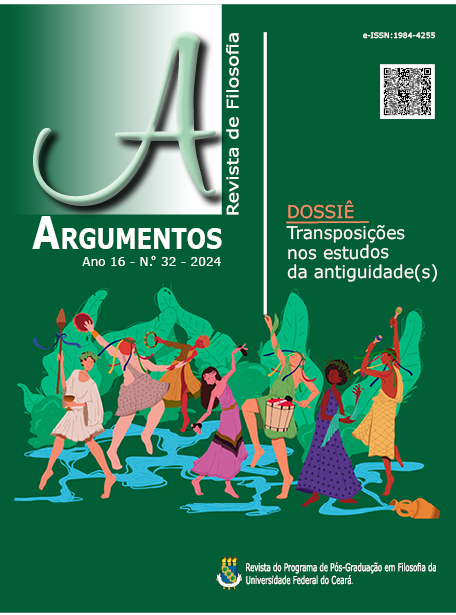The autoerotic nature of the human soul in the Platonic theory of eros
Keywords:
Soul. Eros. Epithymía.Abstract
The article proposes an integrated analysis of the anthropological conception developed by Plato in the dialogue Symposium and in book IV of Republic, in which the philosopher proclaims desire as an original dýnamis of human nature, which acts as a vital and determinant impulse in the human psyche. This approach not only deepens our understanding of the internal dynamics and fundamental motivations of the human being, but also aligns with the defense of an autoeroticism of the human soul.
References
BURY, R G. Introduction. In: The Symposium of Plato. Edited with introduction, critical notes and commentary by Robert Greeg Bury. Cambridge: W. Heffer and Sons, 1909. p. vii-lxxi.
CORNFORD, F. M. The Republic of Plato. In: MELDEN, A. I. (Ed.). Ethical Theories. New York: Prentice Hall Inc., 1950. p. 20-80.
DELCOMMINETTE, S. Facultés et parties de l’âme chez Platon. The electronic Journal of the International Plato Society, n. 8, 2008, p. 1-39.
DOVER, K. J. A homossexualidade na Grécia Antiga. Tradução de Luís Sérgio Krausz. São Paulo: Editora Nova Alexandria, 2007.
FIERRO, M. A. La teoría platónica del éros en la República. Revista de filosofía DIÁNOIA, Cidade do México, v. 53, n. 60, mai./2008, p. 21-52.
FIERRO, M. A. Plato’s theory of desire in the Symposium and Republic. 2003. Doctoral thesis, University of Durham, 2003.
FRIEDLANDER, P. Plato II. Translation of Hans Meyerhoff. London: Routledge and Kegan Paul, 1964.
HYLAND, D. ῎Ερως, ᾿Επιθυμία, and Φιλία in Plato. Phronesis, v. 13, n. 1, 1968, p. 32-46.
KOSMAN, A. Platonic Love. In: WERKMEISTER, W. H. (Ed.). Facets of Plato’s Philosophy. Assen: Van Gorcum, 1976. p. 53-69.
MARONNA, H. A. Lísis, de Platão: tradução, estudo introdutório e notas. 2014. 119 f. Dissertação (Mestrado em Letras Clássicas) – Faculdade de Filosofia, Letras e Ciências Humanas, Universidade de São Paulo, São Paulo, 2015.
PLATÃO. A República. Tradução de Maria Helena da Rocha Pereira. 14. ed. Lisboa: Fundação Calouste Gulbenkian, 2014.
PLATÃO. As Leis. Tradução de Carlos Alberto Nunes. Belém: UFPA, 1980.
PLATÃO. Fedro. Tradução de Maria Cecília Gomes dos Reis. São Paulo: Penguin Classics; Companhia das Letras, 2016.
PLATÃO. Górgias. Tradução, ensaio introdutório e notas de Daniel Rossi Nunes Lopes. São Paulo: Perspectiva; Fapesp, 2011.
PLATÃO. O Banquete. Tradução de Maria Teresa Schiappa de Azevedo. Lisboa: Edições 70, 2016.
PLATÃO. O Sofista. Tradução de Henrique Murachco Juvino Maia Jr. e José Gabriel Trindade Santos. Lisboa: Fundação Calouste Gulbenkian, 2011.
PLATO. Platonis Opera. Texto estabelecido por John Burnet. Oxford: Clarendon Press, 1901. t. II.
PLATÃO. Primeiro e Segundo Alcebíades. Tradução de Carlos Alberto Nunes. Belém: Ed. UFPA, 2015.
REALE, G. Eros - dèmone mediatore: Il gioco delle maschere nel Simposio di Platone. Milano: Rizzoli, 2000.
ROBIN, L. La théorie platonicienne de l’amour. Paris: Presses Universitaires de France, 1933.
SANTOS, J. G. T. A ontologia do belo na concepção platônica do amor: Fedro, Banquete, Sofista. Revista Reflexões, Fortaleza, v. 5, n. 9, jul./dez. 2016, p. 1-12.
SILVA, J. W. da. A tripartição da alma na república de Platão. 2011. 138 f. Tese (Doutorado em Filosofia) – Faculdade de Filosofia, Letras e Ciências Humanas, Universidade de São Paulo, São Paulo, 2012.
SINGER, I. Platonic Eros. In: The nature of love: 1, Plato to Luther. 2. ed. Chicago: The University of Chicago Press, 1984. p. 47-87.
ZINGANO, M. Paideia, virtud intelectual y virtud moral en la Antigüedad. In: VÁSQUEZ, G. H. (Ed.). Filosofía de la educación. Madrid: Editorial Trotta, 2008. p. 55-76.
Downloads
Published
Issue
Section
License
Argumentos magazine is licensed under an International Creative Commons Attribution License.
The Magazine uses CC BY inclusion
1) The authors retain the copyright granted to the magazine or the right to initial publication, with the work regularly licensed under the Creative Commons Attribution, which allows the sharing of the work with acknowledgment of authorship and initial publication in this magazine.
2) The authors are authorized to contract additional applicable contracts, for non-exclusive distribution of the version of the work published in this journal (for example, publication in the institutional repository or as a chapter of the book), recognition of authorship and initial publication in this journal.
3) Authors are authorized and encourage to publish and distribute their work online (for example, in institutional repositories or on their personal pages) at any time before or during the editorial process, as they can generate productive changes, as well as increase the impact and reference of published work.




.jpg)










._._3.png)
1.jpg)
._._._.png)
